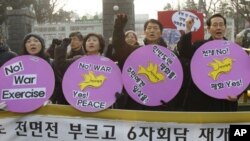South Korean officials say they have tentatively accepted a North Korean proposal to hold high-level military talks.
The meetings would be the first known talks between the two countries since tensions flared over a deadly North Korean military attack on a South Korean island in November.
The South Korean government had rejected a series of previous offers for talks from the North as "insincere" propaganda efforts, though none is believed to have come at such a high level.
To find out what may have led to the apparent breakthrough, VOA's Sarah Williams spoke with our correspondent in Seoul, Steve Herman.
What do we know about the North Korean offer?
"The North Koreans, according to South Korea, proposed military talks with South Korea, and then, shortly after that announcement, the South Koreans said that they had tentatively accepted this North Korean offer to hold the high-level defense talks. And that is coming from both the defense ministry and the unification ministry, but we’re not expected to get any details until mid-Friday morning our time here in Seoul."
South Korea has rejected previous offers for talks. Any idea why they’re apparently accepting it now?
"We’ve detected a shift in the mood here in Seoul in recent days, especially early in the day, I had spoken with a senior government official at the presidential Blue House who told me that an apology for the provocations last year was not necessarily a prerequisite to holding talks. So, that was certainly a signal of a softening of stance. Now, what they are saying is that most definitely that the agenda for these talks must include assurances from Pyongyang that it will act responsibly and there won’t be these sorts of provocations again in the future. So, we’ve definitely seen these sorts of steps forward, a significant step forward, but there’s still a long way to go before we’re actually going to see talks. The North Koreans go back and forth on things like this, there’s a lot of conditions on both sides may make. So, even though we now have the South seemingly accepting the North’s offer, that doesn’t mean that the talks will actually happen. I think that there’s history on our side if we’re going to be skeptical about this. But it’s definitely looking much more positive as far as a significant ratcheting down of the tensions... [that] would be a quite an accurate description at this point."
Seoul has historically provided food and economic assistance to the North, but they halted that assistance last year. Is there any sign that the North is more desperate for that aid and, thus, more willing to talk?
"We know that conditions are more difficult in North Korea and also analysts say that the North Koreans do not like being overly dependent on the Chinese, which is the situation that they’re certainly in now. But the senior government official that I spoke with earlier in the day at the presidential Blue House said that we’re not going to see a repeat of the history of the pattern of the last 20 or 30 years, where there’s some sort of talks and immediately aid and even money is offered to the North Koreans. He was very adamant that no matter what, just because they’re going to be talking, there’s not going to be a resumption of aid and that is not going to happen until the North Koreans meet certain benchmarks with their nuclear program. So, quite [that is] a hard line relatively, compared to past administrations as far as any potential aid going back from the South to the North."
As you mentioned, South Korea has been rattled in the past year, first by the sinking of the Cheonan, then by the North’s artillery attack on South Korea's Yeonpyeong Island in late November. Have things settled down, or are people worried about a possible new conflict?
"Well, life goes on as normal in South Korea. This has been the sort of status quo since 1953, since the truce at Panmunjom. There’s never been a peace treaty between the North and South and intentions have been a sort of roller coaster ride over the past six decades. Obviously, people were very upset by what happened last year, and especially the first attack since the Korean War of artillery being fired on South Korean soil and civilians killed, although we’ve had other incidents blamed on North Korea over the years in which civilians have died. But that incident especially did rattle people. However, I think most people would like to see a peaceful resolution of this problem. But there are very hardened attitudes after the Yeonpyeong island shelling about North Korea, and I think that a lot of people have become much more hard line in their approach towards the communist North since that incident."




